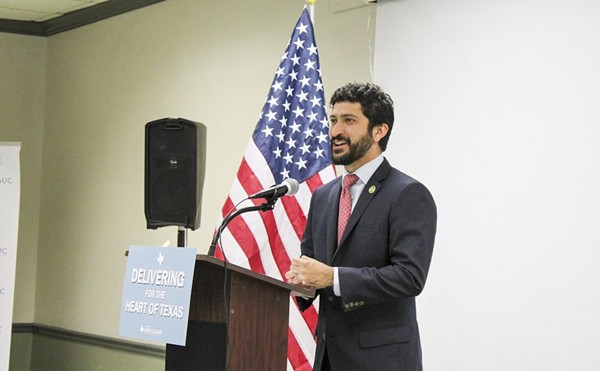To his family, Brent Stephens was a child of promise. A strong student, a star soccer player, a soldier. Even after he experienced a “psychotic break” and was hospitalized for four months during service in Iraq, Stephens was able to pick up the pieces of his life.
He did more than that. Though diagnosed with schizophrenia, Stephens earned a degree in nursing and went into business. He started a “senior sitting” company in San Antonio — like babysitting, except with elderly clients — in 1998.
A few years later he launched the homecare company Meta-Care.
He was living well, although the Internal Revenue Service was only getting a whiff of the total earnings, according to court testimony.
Meta-Care covered the cost of Stephens’s condo, and the company’s profits were funneled into the consulting firm of Brent A. Stephens LLC, according to court documents. That financed the convertible and Mercedes. His success appeared to confirm Stephens’s schizophrenia-fueled belief that he was somehow better than other people or had special powers. However, a decision to move into the world of adult entertainment through a planned escort service brought the era of high living to a close.
After more than two years in custody for his part in a 2007 scheme that lured three Mexican nationals — including two minors — to San Antonio to force them into prostitution, Stephens is pleading guilty to sex-trafficking charges that could keep him in jail for another three years. Stephens’s attorneys insist their client was somehow manipulated into the scheme by his friend Timothy Gereb, who is serving a 10-year sentence for the crime.
“Knowing Mr. Gereb cost our client in the end,” said San Antonio attorney Van Hilley. “He probably never ever would have gotten involved in anything like this but for Mr. Gereb coming into his life.”
But when the pair started seeking out women to pimp, it was Stephens’s personal assistant, Maria De Jesus “Jessica” Ochoa, who recruited family members to go shopping for young women in Nuevo Laredo. The group used Stephens’s money to pay coyotes to hustle three girls into the country. And it was to Stephens’s San Antonio condo that the three were brought to be “inspected” by Gereb and Stephens.
Though the three young women had been promised their work as escorts would be non-sexual, upon arrival Gereb placed a handgun on a table and informed them otherwise. Gereb told the women that if they didn’t comply, their families in Mexico would be harmed.
At this point, Stephens’s attorneys say, Stephens found the women “unsuitable” and got out of the scheme.
At the time, the Stephens-Gereb case was widely reported, but while the Ochoas were trolling the streets of Nuevo Larado for young girls, San Antonio state Senator Leticia Van de Putte was working to push a bill through the state legislature to require sex-trafficking training for all law-enforcement officers. The law-enforcement community was pushing back, however, saying the proposed requirements were unnecessary.
“They just said, ‘Well, you know. We don’t need to be focusing on that. That’s not a major crime,’” said Van De Putte.
Though the 2007 bill ultimately failed, lawmakers instructed the Attorney General’s office and Texas Health & Human Services Commission to examine the impact of human trafficking in the state. Meanwhile, the heart-wrenching story of a 16-year-old trafficking victim wrongfully held as an offender in a Rio Grande Valley jail was quietly shaming Texas law enforcement.
A brother and sister who had run away from their family in the Northwest U.S. were being forced to sell their bodies in South Texas. The children’s pimp had separated the siblings and threatened to kill the young girl if the boy didn’t comply with his demands, Van De Putte said. When the brother was at last picked up by law enforcement, instead of being rushed into rehabilitation, he was charged with prostitution and jailed. Repeated hospitalizations, however, required him to be transported to San Antonio for medical care.
“It wasn’t until the physician examined him and said there was no way this young man sustained these injuries willingly” that the real story came out, said Van De Putte. “I mean, it was horrible. He had to have his bowel resectioned.”
The reports of the Attorney General’s office and the health department, both released this year, zero in on a nationwide problem — the criminalization of trafficked minors. “These victims are treated as criminals,” the AG’s report, The Texas Response to Human Trafficking, says. “Once they make it through the criminal justice system, they are released back onto the street to perpetuate the cycle.” These findings echo an earlier assessment by Shared Hope International, a non-profit organization dedicated to ending sex trafficking worldwide. Shared Hope reported in 2008 that child victims in Bexar County are often treated as offenders, held in juvenile detention, or placed with Child & Protective Services.
The “lack of a secure, safe shelter leaves authorities with few options other than juvenile detention and/or probation for … victims who are high flight risks,” Shared Hope’s assessment found. “Although participants acknowledge that detention leads to revictimization, it is often their only recourse to keep victims from being released back to a pimp or family environment that is many times the origin of abuse.”
Most recently, local law enforcement publicized in a variety of San Antonio media the discovery of a child victim who had been used by pimps from age 11 to 16.
“Now this has really come into the limelight that this is occurring,” said Melissa Moreno, director of the anti-trafficking division of Catholic Charities in San Antonio, who works closely with the local Human Trafficking Task Force based out of the Bexar County Sheriff’s Office. The successful arrests of those believed to be guilty of pimping the child, referred to as “Angela” to protect her identity, overshadow the fact the teenage victim was arrested as a criminal and held in juvenile detention.
The failure is in no way Bexar County’s alone. “Human trafficking” is a relatively new legal classification. The federal government didn’t even identify trafficking until 2000, when Congress passed the Trafficking Victim and Protection Act. It took eight more years to include domestic victims in the legislation under the reauthorization measure of 2008.
“A lot of people think this is just an immigrant problem; it is not,” Van De Putte said.
Despite the fact that three out of four victims of sex trafficking in the United States are U.S. citizens, House Bill 4009, now awaiting Governor Rick Perry’s signature, would be the first state-level legislation to assist domestic victims. HB 4009 would train the law-enforcement and judicial communities to identify and assist trafficking victims, create a statewide Human Trafficking Prevention Taskforce to collect statistical data, maintain a database of assistance programs in the state, and establish a grant program to help fund organizations that fight human trafficking.
While the bulk of HB 4009 was crafted by Van De Putte, the portion that treats U.S. victims was written by first-time Representative Randy Weber of Pearland. Weber’s aide, Chara McMichael, said that 18,000 children enter the sex trade in Texas every year, and that the majority of these are white female runaways between the ages of 12 and 15. The abuse of international trafficking victims in the U.S. is well documented, but the level of violence employed against American kids is even worse, McMichael said.
“Domestic victims, because they know how to get into a taxi cab and go to a police station and all that, they endure typically significantly more drug abuse, torture, manipulation,” McMichael said. “They endure significantly more trauma.”
That makes helping victims all the more difficult. Miriam Elizondo, vice president of client services at the Rape Crisis Center in San Antonio, said that moving victims from abusive environments and into the legal system while attempting to provide therapy poses an enormous challenge.
“Once these clients are rescued, they’re in this legal system where they have no control … They’re stuck. They go from one frustrating, traumatizing situation to a very frustrating, stressful situation,” Elizondo said. “And while they’re not being abused and beaten, they still feel they have no control. They’re not empowered at all.”
Fewer than one percent of the Crisis Center’s clients identify themselves as trafficking victims, a fact Elizondo credits to the amount of manipulation and abuse that is typically involved in these cases.
“We’re telling them the same thing the trafficker told them, and we’re asking them to trust us. ‘You can trust us. I’m safe. I’m not going to hurt you. You’re in control of your destiny. You have rights.’ We’re telling them the same thing that the trafficker told them, and look where they ended up,” Elizondo said. “It’s extremely complicated and we go extremely slow with these clients.”
Without intensive and long-term therapy, trafficking victims are very likely to return to their pimps and old behaviors, McMichael said. “You almost have to reprogram them how to not be a victim anymore.”
For all of Stephens’s apparent initial enthusiasm over launching an escort service, his lack of a criminal record, along with his mental disorder, will likely play to his advantage when he reappears in court on June 25. Gereb wasn’t so clean. Charged with aggravated sexual assault in 1997, Gereb, now 50, was found guilty of indecency with a child. He served no jail time for the offense and was released from the terms of his probation after three years — two years earlier than his original sentence, records show.
Gereb was also a player in the home-health field, launching GBR Home Health Care in 1998, according to state documents. He served as a co-director with Stephens on the boards of both Meta-Care and Total Therapy Solutions. And he partnered with Stephens in a failed securities-trading venture known as Broderick Young Securities Corp.
Remarkably, the trio of victims from Nuevo Laredo was rescued less than a week after they crossed into the United States. They had apparently told their families they were going to work at a restaurant in Pearsall, south of San Antonio, according to the Laredo Morning News. But when family members hadn’t heard from them after several days, they contacted U.S. Immigration and Customs officials across the river. Supplied with the girls’ cell-phone numbers, ICE agents quickly tracked them down in May of 2007, and arrested Jessica, Isabel, and Pilar Ochoa. Two weeks later, federal agents arrested Gereb, and discovered a “large quantity of shredded documents.” He was also linked to more than $300,000 in wire transfers to countries including Nicaragua, Panama, the Philippines, and Suriname. Stephens, who had fled the state after the initial arrests, turned himself in the day after Gereb was picked up.
The case shows that while political attention has been focused on international trafficking victims, the move toward assisting local victims is vital. While Stephens allegedly pulled out of the escort deal, Gereb pushed ahead. However, instead of trolling Mexican cities again, he started scouting San Antonio’s streets. According to the Shared Hope report: “Gereb admitted plans to start sex trafficking local children.” Local investigators told the agency that Gereb “had a quota of 10 girls to fill for a brothel in Louisiana.”
Federal prosecutors on the Stephens case failed to return repeated calls for comment, but the former head of Bexar County’s Task Force on Human Trafficking told the Current to expect new trafficking cases to emerge in the near future.
In addition to the effort to develop training and provide resources for the first responders, some are fighting trafficking by attempting to reduce demand.
Darrell MacLearn, anti-trafficking project manager in Texas for Concerned Women of America, has his work cut out for him. He laments the glamorization of pimps, the criminalization of “whores,” and the normalization of “johns.” At no time in the history of the country has the sex trade been so deeply enmeshed in popular culture. For that reason, it may be that at no time since Emancipation has the slave trade been this profitable.
To get their message out, MacLearn and others at the fundamentalist CWA focus on informing church communities across the county about the realities of sex trafficking. They also distribute flyers at truck stops. If sex customers can be trained, the reasoning goes, then just maybe we can save the children.
“It’s economics 101,” said MacLearn. “If you don’t have a buyer for 12-year-old girls, he’s not going to try to sell 12-year-old girls.”

















